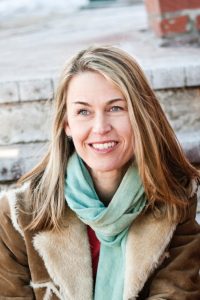INTERVIEW WITH SARAH STARK

What is the story behind your novel, Out There?
The first veteran of Iraq who I met was named Reuben Santos. He was part-Native, a poet, and 24-years old.
I was teaching literature at the Institute of American Indian Arts (IAIA) in Santa Fe, NM in the spring of 2007 and we were two weeks into our study of One Hundred Years of Solitude by Gabriel Garcia Marquez. And that’s when Reuben spoke up, sharing with the class the fact that he was recently returned from two tours of duty with the U.S. Army in Iraq. He had connected to some part of Garcia Marquez’s work, most likely the character Colonel Aureliano Buendia who returns home after twenty years of war, but I don’t remember the specifics. What I do remember–and what fueled me to write this novel at the very start–was my shock. That sitting here before me was a soft-spoken creative writing student who had recently been at war. Reuben shattered any previous notions I had about what a war veteran might look and act like. And it was in that moment, in my mind, that I began writing this novel.
It began as a novel about all kinds of unlikely soldiers. Poets and musicians and painters. What would it be like for these artists to experience loss on a daily basis? How might they find beauty within all that loss?
After two years of writing, I decided to try to reconnect with Reuben, to let him know about the project, and to see if he might be willing to answer a few questions that had come up for me in the writing. But instead of finding him, I discovered his obituary online, and the fact that he had taken his own life not long after I had known him in class. There was little doubt that his suicide was the result of having lost the battle with his war memories.
The news was devastating. I sat in bed and cried. How had this happened? Why?
Eventually I wrote to his parents, explaining my connection to their son and the fact that I was working on a novel largely inspired by him. I felt I somehow needed their blessing to go on. At the very least, I wanted them to know that I was working, writing, my response to the sadness I felt.
Eventually my commitment to writing the story overcame the darkness. I knew that it was important to finish the novel–to write a story that was grounded in truth and somehow also managed to find some redemption. It seemed necessary in my mind to create a new ending to Reuben’s life. A re-imagined ending in which a young veteran begins to heal. A story in which a young veteran begins to see light within his darkness. This became my mission and Out There is the result.
How long have you been writing? Is this your first novel?
As for fiction, I am largely self-taught. I read. I study favorite stories and novels. I write daily.
Prior to Out There were two other novels, neither published. Both good efforts.
What are you reading now?
What early experiences do you think shaped you as a writer?
Throughout this time, we were living in a beautifully rough and unfettered landscape. Cedars and limestone outcroppings and caliche. It was the 1970s west of Austin and my parents, though not hippies, were fairly unconventional. My dad built our house over the course of five years with very little outside help as we lived in it. My mom baked bread and sprinkled wheat germ on her cereal each morning. We were composting (plastic bags of banana peels and eggshells in the freezer) when most people had not heard the term. They were both teachers, so they talked a lot about books (in my mom’s case) and number sense (in my dad’s). There were lots and lots of teaching moments. Wide-open spaces and unscheduled time existed in abundance. We had an old paddleboat on our creek and a concrete tennis court with a solid plywood backboard upon which I pounded forehands and backhands. All this combined into a very real sort of freedom that, I believe, allowed my mind to expand as a child, to imagine fictional ends to all sorts of realities, and eventually, to have the courage the write.
